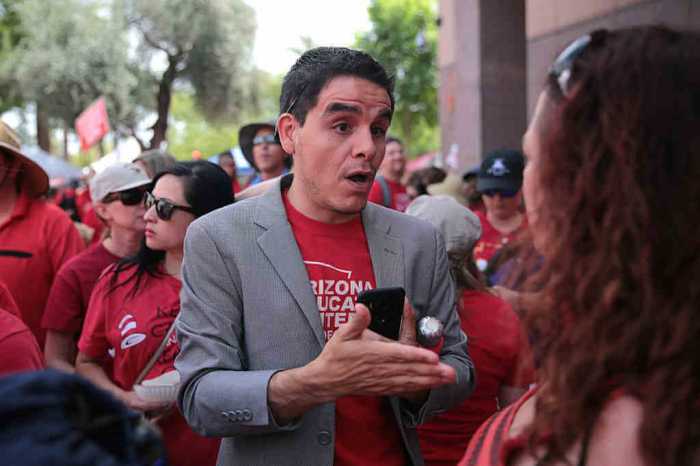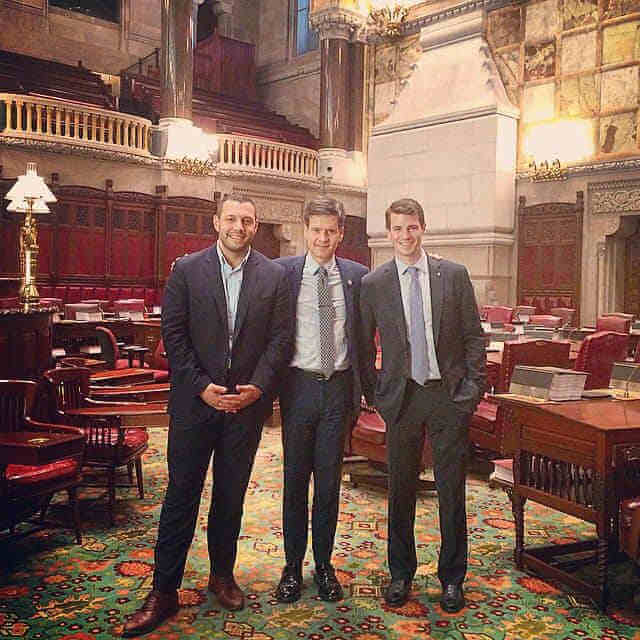BY ARTHUR S. LEONARD | A federal court judge in Pennsylvania has denied a school district’s motion to dismiss Title IX and equal protection claims by an elementary school transgender student denied the right to use the girls’ bathroom consistent with her gender identity.
On November 22, District Judge Robert D. Mariani, ruling on a suit brought on behalf of A.H. by “her next best friend and mother, Tracey Handling,” rejected the argument by the Minersville Area School District in central Pennsylvania that because the Trump administration withdrew an earlier Obama guidance on protection of transgender students under the Title IX sex nondiscrimination provisions of the Education Amendments of 1972, the complaint failed to state a valid claim.
Other federal districts courts in recent years, including another judge in Pennsylvania regarding the Pine-Richland School District near Pittsburgh, have also sided with transgender students on Title IX and equal protection claims, with the Chicago-based Seventh Circuit Court of Appeals in May becoming the first appellate bench to endorse that view in a suit brought by Ashton Whitaker, a male high school student in Kenosha, Wisconsin. The school district there is currently seeking Supreme Court of the Seventh Circuit decision, which could resolve this question nationally by June of next year.
Pennsylvania judge refuses to dismiss Title IX, equal protection claims
This past August, a different federal district court in Pennsylvania rejected claims made on behalf of cisgender high school students and their parents by the right-wing Alliance Defending Freedom that the youths’ rights of privacy were violated by the Philadelphia-area Boyertown Area School District’s policy of allowing trans students to access bathrooms consistent with their gender identity.
In the Minersville case, according to Judge Mariani’s decision, A.H. “was diagnosed with gender dysphoria while in kindergarten. Under the care of a pediatric psychologist, Plaintiff and her family have been exploring ways for Plaintiff to express her gender identity at home, in school, and in the community… Since beginning kindergarten in 2014, Plaintiff has continuously presented herself both in and out of school as a female. Plaintiff uses a female name, dresses in clothing traditionally associated with females, is addressed using female pronouns, and is known to her classmates as a female student.”
Regardless of Handling’s request that her daughter be allowed to use the girls’ bathroom, however, the school superintendent, Carl McBreen, said the privacy of other students trumped the trans girl’s needs.
When she was in kindergarten, the issue did not come up — since the classroom had only a single-use bathroom — until a field trip, when teachers required A.H. to wait until all the boys had used a male-designated bathroom and then allowed her to use it. “The incident upset Plaintiff and resulted in some of her classmates asking her why she, as a girl, was using the boys’ bathroom,” Mariani wrote.
When Handling questioned the principal about this, she was told it was “school policy that a child must use the bathroom that corresponds with the sex listed on the child’s birth certificate,” in line with “protecting” other students from A.H. Handling, however, never received the written policy she requested. When A.H. entered first grade and Handling asked that her daughter be allowed to use the girls’ bathroom, McBreen, the superintendent, told her, “Minersville isn’t ready for this.” Meanwhile, in talking to Handling, the principal referred to A.H. using male pronouns, even after being corrected.
When the Obama administration issued its guidance to public school districts nationwide stating that trans students were protected under Title IX sex nondiscrimination provisions, Breen informed Handling her daughter could use the girls’ bathroom but that the school “has not created any policy on bathroom access for transgender students.”
A.H. then filed suit seeking a court order that the district comply with Title IX and equal protection requirements.
In its motion to dismiss the Title IX claim, the school argued that the Trump administration’s withdrawal of the Obama guidance left “no legal basis to support a Title IX claim against the school district for transgender discrimination.” Mariani, however, quoting from the Pine-Richland School District ruling, noted that the new administration’s action established no new interpretation of Title IX, but merely created “an interpretive vacuum.”
Looking to that decision as well as the Seventh Circuit’s ruling in the Kenosha case, Mariani observed that Title IX courts have looked to precedents under Title VII of the 1964 Civil Rights Act for guidance on the scope of sex nondiscrimination protections. Both courts, he found, concluded, in the words of the Seventh Circuit, that “a policy that requires an individual to use a bathroom that does not conform with his or her gender identity punishes that individual for his or her gender non-conformance, which in turn violates Title IX.”
The Seventh Circuit specifically rejected the argument that providing access to a gender-neutral single user restroom is “sufficient” to relieve schools of their nondiscrimination responsibility.
Turning to A.H.’s equal protection claim under the 14th Amendment, Mariani found that applying heightened scrutiny to the school’s policy and actions — which both sides agreed was the appropriate standard for review — the Minersville schools had not presented proof that they serve an important government objective.
“Plaintiff has adequately alleged the existence of a school policy that treated her differently on the basis of her transgender status or nonconformity to gender stereotypes,” Mariani wrote. “As such, she has sufficiently stated a claim for relief under the Equal Protection Clause.”
A plaintiff making a constitutional discrimination claims must demonstrate discriminatory intent, and here the judge pointed to statements by school officials that at this stage of the case provide sufficient evidence of this.
Mariani was appointed to the court by President Barack Obama in 2011. A.H. and her mother are represented by David L. Deratzian of Hahalis & Kounoupis PC in Bethlehem.



































